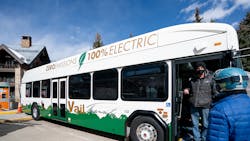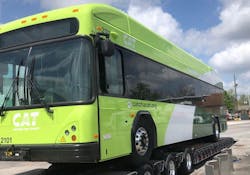Chatham Area Transit, Vail Transit set to welcome first electric buses
Transit systems in Vail, Colo., and Savannah, Ga., are readying their networks for new battery-electric buses to take the streets.
GILLIG will provide a total of 10 battery electric buses, four to Vail Transit and six to Chatham Area Transit (CAT).
The Center for Transportation and the Environment evaluated the benefits electric buses could bring to CAT in 2017 and determined the transit system could see a reduction in emissions, energy consumption and lifetime vehicle costs by transitioning to electric vehicles.
Vail Transit in Colorado has also been planning for its electric bus transition since 2017 and on April 6, it hosted the Vail Town Council for a preview and test ride one of the four new vehicles.
Vail is exploring the development of an EV readiness plan and commitment to become a Go EV City. The addition of the electric buses supports the Eagle County Climate Action Plan, which also includes a call encouraging smart commuting using traditional transit or active transit modes.
“This is a significant step forward in meeting our climate action goals for the future,” said Vail Mayor Dave Chapin. “The transportation sector is the second highest contributor of greenhouse gas emissions in Vail and the top contributor in Eagle County. Transitioning to electric vehicles will greatly reduce emissions and is one of the most effective ways to achieve a 50-percent reduction in emissions by 2030 and 80 percent by 2050.”
Funding for the buses was offset by a Federal Transit Administration grant and a second grant from the Colorado Department of Transportation funded infrastructure upgrades at the bus barn to support the electric fleet.
About the Author

Mischa Wanek-Libman
Group Editorial Director
Mischa Wanek-Libman is director of communications with Transdev North America. She has more than 20 years of experience working in the transportation industry covering construction projects, engineering challenges, transit and rail operations and best practices.
Wanek-Libman has held top editorial positions at freight rail and public transportation business-to-business publications including as editor-in-chief and editorial director of Mass Transit from 2018-2024. She has been recognized for editorial excellence through her individual work, as well as for collaborative content.
She is an active member of the American Public Transportation Association's Marketing and Communications Committee and served 14 years as a Board Observer on the National Railroad Construction and Maintenance Association (NRC) Board of Directors.
She is a graduate of Drake University in Des Moines, Iowa, where she earned a Bachelor of Arts degree in Journalism and Mass Communication.


